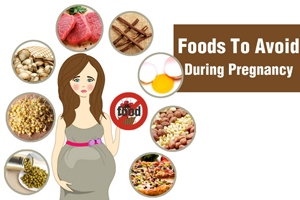The joy of expecting a baby often comes with a heightened sense of responsibility, especially when it comes to diet. The World Health Organization reports that approximately 3.3 million newborns die within the first four weeks of life. Many of these deaths can be attributed to preventable causes, including poor maternal nutrition. Understanding which foods to avoid during pregnancy can significantly reduce the risk of birth defects and other health problems in newborns.
In this article, we’ll explore the latest information on foods to avoid during pregnancy and why they can be risky. We’ll also provide actionable tips to help you make informed choices and ensure a happy, healthy pregnancy for both you and your baby.
Top Foods to Avoid During Pregnancy

Here’s a list of the top foods to avoid during pregnancy, along with the potential risks they can pose:
- Mercury-rich fish: Fish is a great source of lean protein and omega-3 fatty acids, which are important for your baby’s development. However, certain fish are high in mercury, which can harm your baby’s nervous system. Steer clear of king mackerel, shark, swordfish, and tilefish. Opt for lower-mercury options like salmon, cod, pollock, canned light tuna, and shrimp.
- Raw or undercooked meat, poultry, and eggs: Raw animal products can harbor harmful bacteria like Salmonella or E. coli, which can cause foodborne illness. This can lead to dehydration, fever, and discomfort for you, and potentially even miscarriage or premature birth. Make sure all meat, poultry, and eggs are cooked to a safe internal temperature (160°F for meat and poultry, 165°F for ground meat, and 170°F for eggs).
- Unpasteurized milk and milk products: Unpasteurized milk and soft cheeses made with unpasteurized milk can contain bacteria like Listeria, which can cause serious illness in pregnant women and can even be fatal to your baby. Stick to pasteurized milk products and hard cheeses like cheddar, Parmesan, and mozzarella.
- Raw Sprouts: Raw sprouts can harbor bacteria like E. coli and Salmonella because the warm, humid conditions they’re grown in are perfect for bacterial growth. If you love sprouts, cook them thoroughly before eating.
- Caffeine: While a moderate amount of caffeine (less than 200mg per day) is generally considered safe during pregnancy, excessive caffeine intake can increase your risk of miscarriage and low birth weight. Be mindful of the caffeine content in coffee, tea, soda, and chocolate.
- Alcohol: There is no safe amount of alcohol to consume during pregnancy. Alcohol can pass through the placenta to your baby and disrupt their development, leading to a range of birth defects known as fetal alcohol spectrum disorders (FASDs).
- Unwashed fruits and vegetables: Fruits and vegetables are an essential part of a healthy pregnancy diet, but it’s important to wash them properly first to remove dirt, pesticides, and parasites that can cause illness. Wash all produce thoroughly under running water before eating or cooking.
- Deli meats and hot dogs: Deli meats and hot dogs can harbor Listeria bacteria, especially if they haven’t been handled or stored properly. If you do enjoy deli meats, heat them until steaming hot before eating.
- Certain herbal teas: Some herbal teas, such as chamomile and raspberry leaf tea, are generally considered safe during pregnancy. However, others, like pennyroyal tea and comfrey tea, can be harmful. It’s always best to consult with your doctor before consuming any herbal teas during pregnancy.
Additional Tips for a Healthy Pregnancy Diet
- Focus on a balanced diet: Aim for a variety of nutritious foods from all food groups, including fruits, vegetables, whole grains, lean protein sources, and healthy fats. This will ensure you and your baby are getting the essential vitamins and minerals you both need.
- Don’t forget about prenatal vitamins: Prenatal vitamins provide folic acid and other important nutrients that are crucial for your baby’s development. Take them throughout your pregnancy as directed by your doctor.
- Stay hydrated: Drinking plenty of water is essential for good health in general, and especially important during pregnancy. Aim for eight glasses of water per day, or more if you’re feeling thirsty.
- Listen to your body: Cravings are common during pregnancy, but it’s important to pay attention to your body’s cues. If a particular food makes you feel unwell, avoid it.
- Consult with your doctor: If you have any questions or concerns about your diet during pregnancy, talk to your doctor or a registered dietitian. They can provide personalized advice based on your individual needs and health history.
Final Thoughts
Understanding which foods to avoid during pregnancy can help ensure the health and safety of both you and your baby. Always consult with your healthcare provider if you have any concerns or questions about your diet during pregnancy. Remember, a healthy diet is one of the best gifts you can give your unborn baby.
